Barista Competitions: U.S. Coffee Championships & World Barista Championship
Making The Perfect Coffee: “Barista Style” Coffee
A barista is a coffeehouse employee, who prepares and serves espresso-based coffee drinks. Has/her profession and especially is to strive to create the perfect espresso in a coffee house.
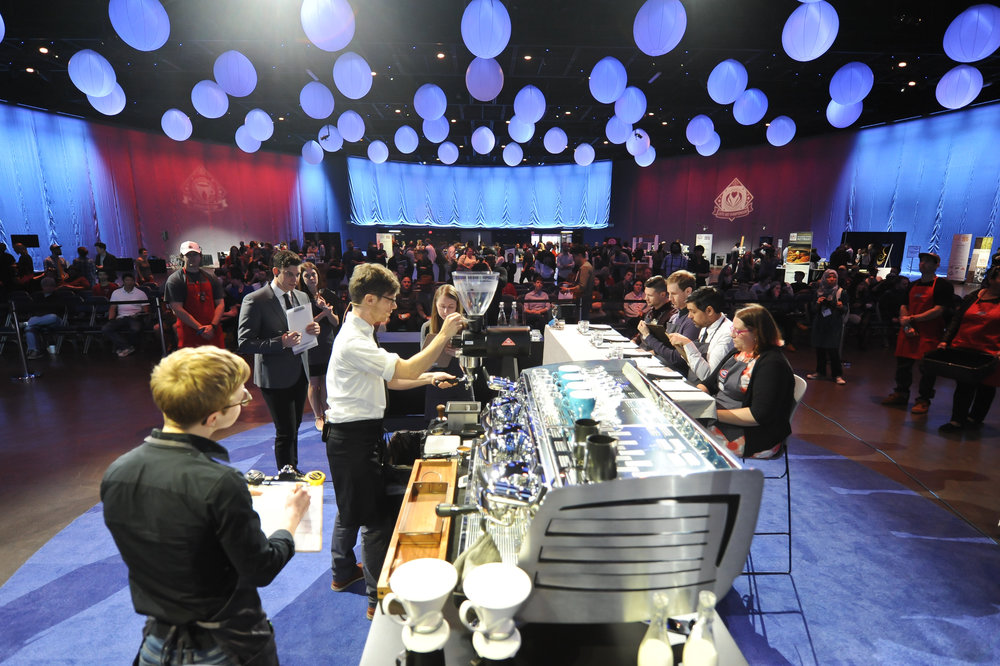
The barista possesses extensive knowledge of different kinds of beans and roasts.
Baristas have the technical skills required to master the espresso machine.
What is barista style coffee?
Over the past couple of years, we’ve seen a dramatic increase in the popularity of “barista style” instant coffees.
They’re basically a premium instant that mimics the taste of a traditionally brewed drink through the addition of finely milled coffee beans.
Barista considers the extraction of coffee as art and they actually perform in front of their customers each time they prepare an espresso, a cappuccino, a caffe latte or a cafe mocha.
However, if they wish for a larger audience and consider themselves as really talented they can consider competing in barista competitions of Barista Guild of America. (United States Barista Championship)
Barista Competitions
Barista Competition events take place every year and they are held at local and national levels. The ultimate title to win is the World Barista Champion.
The World Barista Championship was first held in 2000 in Monte Carlo and it became quickly a public event where the best baristas from different countries battled for espresso making supremacy.
The World Barista Championship takes place every year in a different country and the competitors are the winners of the national barista competitions.
In 2018, 55 champions from around the globe meet in Amsterdam for four days of fierce competition at the 2018 World Barista Championship, from 20-23 June.
In the United States, the Specialty Coffee Association of America (SCAA), hosts several local barista competitions.
Here is the list of the Winners in World Barista Championship (World Barista).
- 2018 – Amsterdam, Netherlands – Agnieszka Rojewska, Poland
- 2017 – Seoul, South Korea – Dale Harris, United Kingdom
- 2016 – Dublin, Ireland – Berg Wu, Taiwan (Score: 583.0 out of 719)
- 2015 – Seattle, USA – Sasa Sestic, Australia (Score: 618 out of 814)
- 2014 – Rimini, Italy – Hidenori Izaki, Japan
- 2013 – Melbourne, Australia – Pete Licata, United States
- 2012 – Guatemala City, Guatemala – Raúl Rodas, Guatemala
- 2011 – Bogota, Colombia – Alejandro Mendez, El Salvador
- 2010 – London, England – Michael Phillips, United States
- 2009 – Atlanta, United States – Gwilym Davies, United Kingdom
- 2008 – Copenhagen, Denmark – Stephen Morrissey, Ireland
- 2007 – Tokyo, Japan – James Hoffmann, United Kingdom
- 2006 – Bern, Switzerland – Klaus Thomsen, Denmark
- 2005 – Seattle, United States – Trouls Overdahl Poulsen, Denmark
- 2004 – Trieste, Italy – Tim Wendelboe, Norway
- 2003 – Boston, United States – Paul Bassett, Australia
- 2002 – Oslo, Norway – Fritz Storm, Denmark
- 2001 – Miami, United States – Martin Hildebrandt, Denmark
- 2000 – Monte Carlo, Monaco – Robert Thoresen, Norway
On March 15-17, 2019 USCC Coffee Championships will take place in Kansas City, MO, Convention Canter.
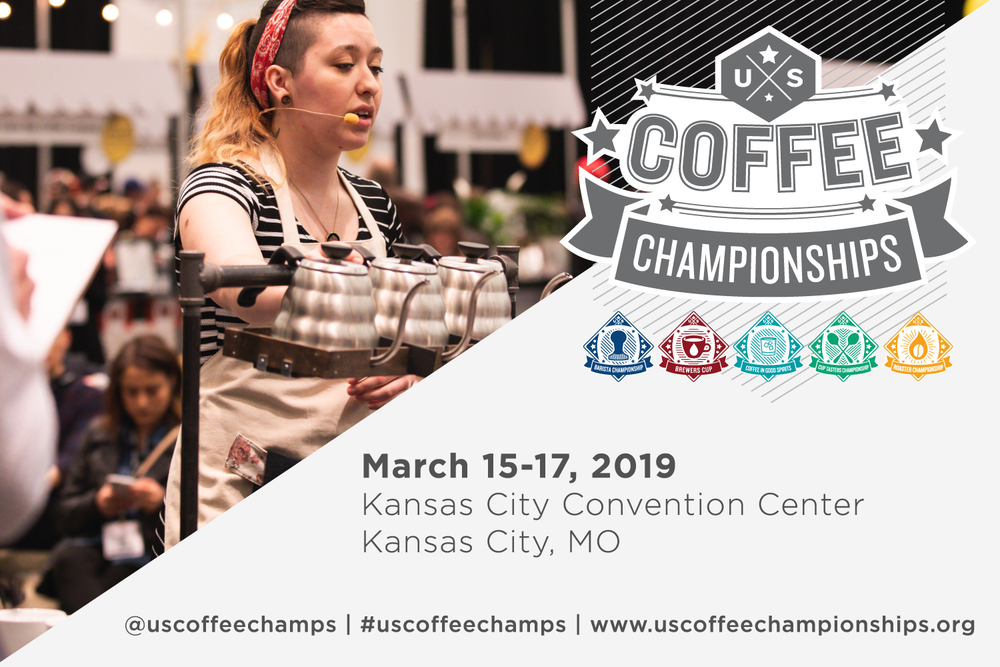
There are ten regions, and each state has been assigned to a region.
Local barista competitions are sponsored by businesses, and the winner of each of the local events has the chance to try to impress the jury at the US Barista Championship.
There are many barista competitions in Europe and the United Kingdom.
Canada, Australia, and Central America also have barista competitions at the local, regional and national levels.
Barista Skills Challenge – TUCO Competitions 2017
In a barista competition, the judges have to assess both the contenders and the coffee drinks they make.
The criteria based on which they score each barista involve the quality and taste of the beverage, personal presentation, technique and also the presentation of the coffee drink.
What Contenders are Challenging in Barista Competition
The baristas race against the clock as they are only allowed to perform for 15 minutes. They also have 15 minutes before the actual presentation to prepare with every detail for the show – ingredients like syrups, chocolate sprinkles or anything that you can think of except alcohol, cups, trays, blenders, mixers, and portable burners.
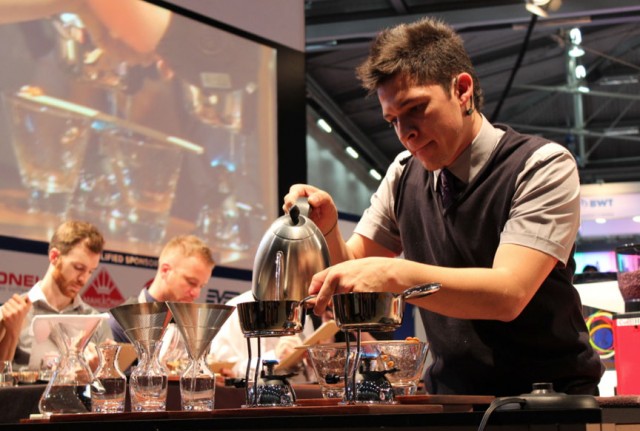
Contenders even roast their own coffee and bring it with them at the competition. After serving their drinks, baristas have 15 minutes to clean their station before they make room for another contestant. The espresso machines used in the competition are key to the taste of the coffee. The machines must be left absolutely clean and free from any impurities.
During the 15 minute performance, interval baristas have to prove their skills by preparing 4 espressos, 4 cappuccinos, and 4 signature drinks.
Four sensory judges that have to decide on the quality of the drinks sample each one of the beverages.
While preparing the beverages, the baristas have to present their work, give details about the ingredients they used to the audience and also treat the judges as customers in a coffee shop. One can only imagine the stress.
After the espressos and cappuccinos, which are finished with latte art – complicate designs drawn atop the cup with foamed milk by using the pitcher, the time comes for the signature drink.
What is the signature drink?
The signature drink is the competitor’s original creation. The drink is where baristas reveal their creativity and skills combining roasts, syrups, steaming and frothing milk.
The use of all sorts of ingredients and flavors is turning their beverages into savory works of art.
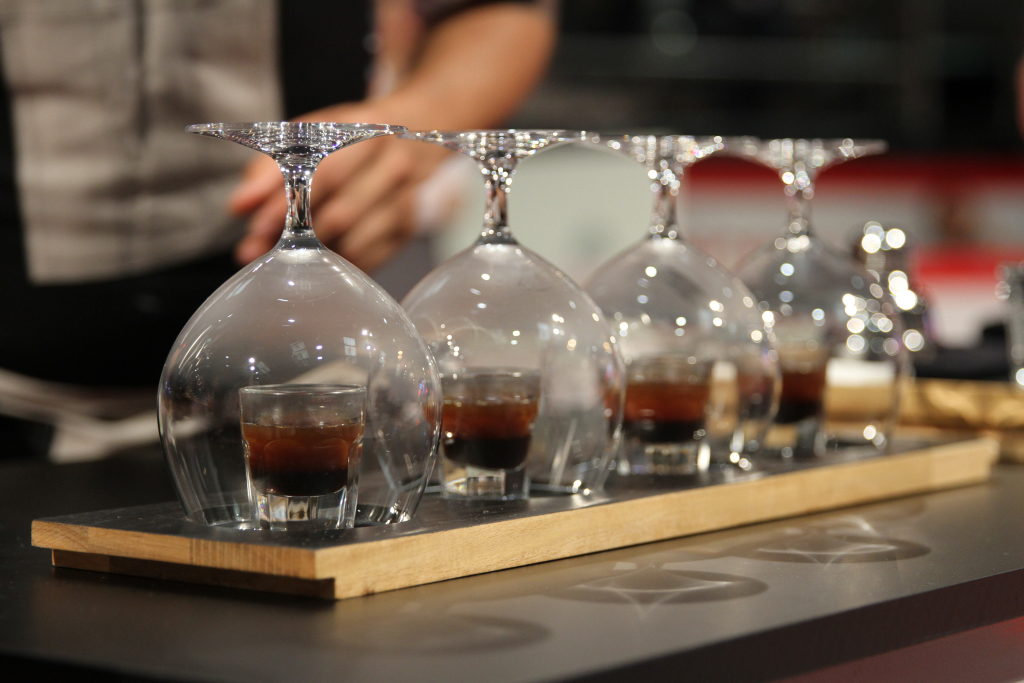
The baristas can spend even months to invent this perfect drink that can bring them the victory in a competition.
Here are some examples of drinks that barista champions have invented:
- Troels Poulsen, the 2005 World Barista Championship winner, created a drink called ESB, as in “enhanced sensory balance” by combining melted pepper-gel, espresso, and lavender syrup.
- Phuong Tran, the 2005 USA Barista Champion, was inspired by her childhood in creating the Crimson Sage, a drink made of sugar cane juice, white pepper powder and steamed milk infused with sage leaves. She said that as a child she loved drinking sugar cane juice with ice and she always dreamed of using it in a drink.
- Sammy Piccolo, the 2004 Canadian Barista Championship winner, created “Insieme” by using raw sugar, egg yolks, curry, bittersweet chocolate, and milk.
- Bronwen Serna, USA Barista Champion of 2004, entitled her signature drink “Sweetness” because the main “secret” ingredient was honey. She also used dark chocolate powder and served it with a dark chocolate square.
Baristas train hard for these competitions, especially if they have the chance to participate in the World Barista Championship.
They try to bring to perfection their technique and put together their program as during the competition everything has to work smoothly, no glitches are allowed.
Baristas can actually be compared to athletes rehearsing for the Olympic games as some of them even have coaches that sometimes play the role of judges in preparation for the competition.
Barista training
Well, perhaps after reading about the competition requirements it might be wise to brush up a bit on your skills.
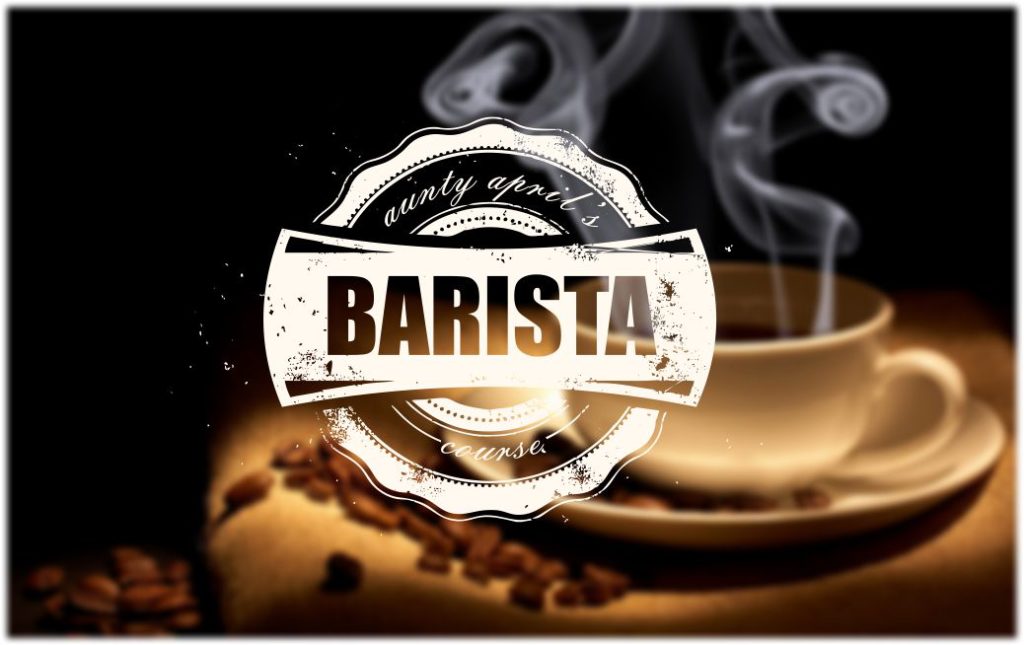
There are several ways to either get basic skills training as a barista or enhance your existing skills:
- Books and manuals. There are many books or manuals available that take you to step by step through the processes of making an espresso, a cappuccino and other specialty coffee drink. The drawback is that you only have still pictures to look at which may make it difficult for beginners to see the details of the methods.
- Videos. These provide both visual modeling as well as commentary on how to produce the perfect cup of espresso.
- Training classes. There are training locations in most areas that offer courses that range from three hours to a full day on learning the secrets of a barista. Many of these programs also deal with how to care for the espresso machine and offer a certificate upon completion.
- Hands-on. Some experienced barista will offer personal training or mentoring for those interested in becoming a barista or in improving their skills.
Barista Certificate Programs
More than a mere pourer of java, the barista excels at drawing high-octane coffees made with espresso and milk. While certification isn’t required to become a barista, the coursework leading to certification can help you develop a broader knowledge of coffee beans and beverages that will help you do your job more effectively.
With two levels of dynamic content, the SCA’s Barista Certificate Program presents a series of classes designed to accelerate a student’s professional trajectory with world-recognized instruction in espresso and espresso drink preparation, equipment operation and customer service.
Whatever you decide to do, if you have a talent for making a great cup of espresso you should consider entering a barista competition.
You will meet other people that share your passion for coffee and will certainly get some new ideas to try in your coffee shop.
Related Posts
-
 Coffee Franchise Guide: ABCs of a Coffee Franchise
No Comments | Nov 12, 2018
Coffee Franchise Guide: ABCs of a Coffee Franchise
No Comments | Nov 12, 2018 -
 Choosing Automatic Espresso Coffee Makers: Best Automatic Coffee Machine for Home
No Comments | Nov 24, 2018
Choosing Automatic Espresso Coffee Makers: Best Automatic Coffee Machine for Home
No Comments | Nov 24, 2018 -
 Buying Coffee Roasters to Brew the Perfect Cup of Coffee
No Comments | Jan 7, 2019
Buying Coffee Roasters to Brew the Perfect Cup of Coffee
No Comments | Jan 7, 2019 -
 An Espresso Coffee and Espresso Coffee Maker – The Best Way to Start Your Day
No Comments | Nov 25, 2018
An Espresso Coffee and Espresso Coffee Maker – The Best Way to Start Your Day
No Comments | Nov 25, 2018
About The Author
CoffeeFan
Of course size matters! Nobody wants a small cup of coffee! Who knows where technology would be without a good cup of coffee in the morning! Hell, I don't even know where I'd be! Coffee makers, grinders, and other coffee product reviews from an actual coffee lover! Can you potentially extend your life by drinking your perfect cup of coffee, topped with a silky and generous crema, exactly as you like? Find out here.

